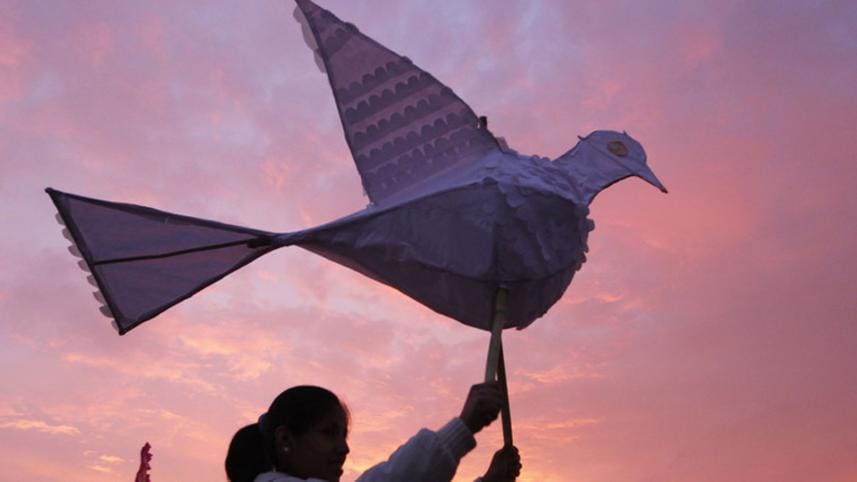Investing in a feminist peace

During the Covid-19 pandemic, public life in much of the world has largely ground to a halt. For the two billion people living in conflict-affected countries, however, there has been no lull in violence and upheaval. Some of the world's conflicts have even escalated or been reignited during the crisis, dealing devastating new blows to infrastructure and healthcare systems that were only beginning to be rebuilt. Globally, we continue to invest far more in the tools of war than in the foundations of peace.
Of course, some are working for peace. On March 23, at the outset of the pandemic, United Nations Secretary-General Antonio Guterres called for a global ceasefire, in order to enable countries to focus on the Covid-19 crisis and allow humanitarian organisations to reach vulnerable populations. More than 100 women's organisations from Iraq, Libya, Palestine, Syria and Yemen quickly joined the appeal with a joint statement advocating a broad Covid-19 truce, which could form the basis for a lasting peace.
It should come as no surprise that women were among the first to support the call for a ceasefire. This month, governments and civil society came together to mark 20 years since UN Security Council Resolution 1325 first recognised women's pivotal roles on the frontlines of peace-building efforts.
It is women—including young women—who do much of the painstaking, long-term work that underpin high-profile formal agreements, which are still often reached in talks that exclude them. For example, in Syria, women have negotiated ceasefires to allow the passage of humanitarian aid, worked in field hospitals and schools, distributed food and medicine, and documented human rights violations. In South Sudan, women have mediated and resolved tribal disputes to prevent conflicts from escalating to violence.
Women also spearhead the critical work of campaigning for peace, including through education programmes, which teach young people that conflict is never inevitable. Feminist organisations have long called for nuclear disarmament, arms control, and the reallocation of funds from the military to social investments.
These appeals are essential. But they have gone unanswered. So has the UN's call for a Covid-19 ceasefire: according to the Norwegian Refugee Council, in the two months following Guterres's appeal, armed conflict in 19 countries displaced at least 661,000 people. Unless we listen to women, and shift our investments from war toward peace, the devastation will continue.
Last year, global military expenditure reached USD 1.9 trillion, following the largest annual increase in a decade. In the last quarter-century—since the landmark Beijing Declaration and Platform for Action called on governments to "recognise and address the dangers to society of armed conflict and the negative effect of excessive military expenditures"—defence spending has doubled.
More weapons and soldiers mean fewer resources for the 55 percent of the global population—including nearly two-thirds of the world's children—who lack any social protection, leaving them exposed to the pandemic's brutal social and economic consequences. Military might will not help the 83-132 million people added by Covid-19 to the global tally of the undernourished in 2020.
Liberian Peacemaker and Nobel Peace Prize laureate Leymah Gbowee has it right: "Peace is not the absence of war," she has said, but rather "the full expression of human dignity." It "is an environment in which human needs can be met. It means education for our children, health systems that function, a fair and unbiased justice system, food on the table in every home, an empowered, recognised, appreciated, and fully compensated community of women, and a lot more."
We should be spending our money not on tools of destruction, but on a kind of "feminist peace" that upholds basic economic and social rights for all. This means guaranteeing broad social protections and delivering vital services, such as health care, childcare, and education. The provision of such services has been proven to reduce conflict-fueling inequality.
The pandemic has highlighted the critical importance of other services as well. For example, shelters for survivors of gender-based violence have faced surging demand during Covid-19 lockdowns, and need more funding to meet it. In addition, governments should be ensuring adequate supplies of medical and personal protective equipment, which have often run out during the pandemic, even in the world's richest countries.
A feminist peace also means that everyone's voice is heard, with all groups included fully and meaningfully in the decisions that affect their lives. Here, women's organisations have a vital role to play, helping women and other marginalised groups gain access to decision-making arenas and giving them the resources and confidence to participate.
But, again, more funding is needed. Bilateral aid to women's organisations in fragile or conflict-affected countries averaged USD 96 million per year in 2017-18—a mere 0.005 percent of global military expenditure.
For all the devastation it has caused, the Covid-19 crisis also represents a generational opportunity to build more inclusive economies and societies, free of the scourge of violent conflict. A concerted effort to demilitarise our world and build a feminist peace—beginning with a global ceasefire, and followed by a comprehensive reappraisal of how we allocate our resources—must be central to this vision.
Phumzile Mlambo-Ngcuka is Executive Director of UN Women.
Copyright: Project Syndicate, 2020.
www.project-syndicate.org
(Exclusive to The Daily Star)




 For all latest news, follow The Daily Star's Google News channel.
For all latest news, follow The Daily Star's Google News channel.
Comments